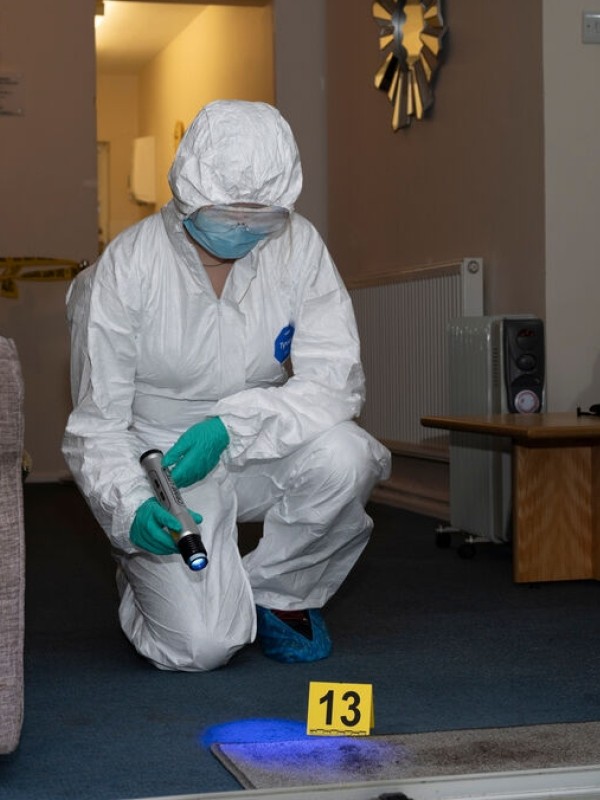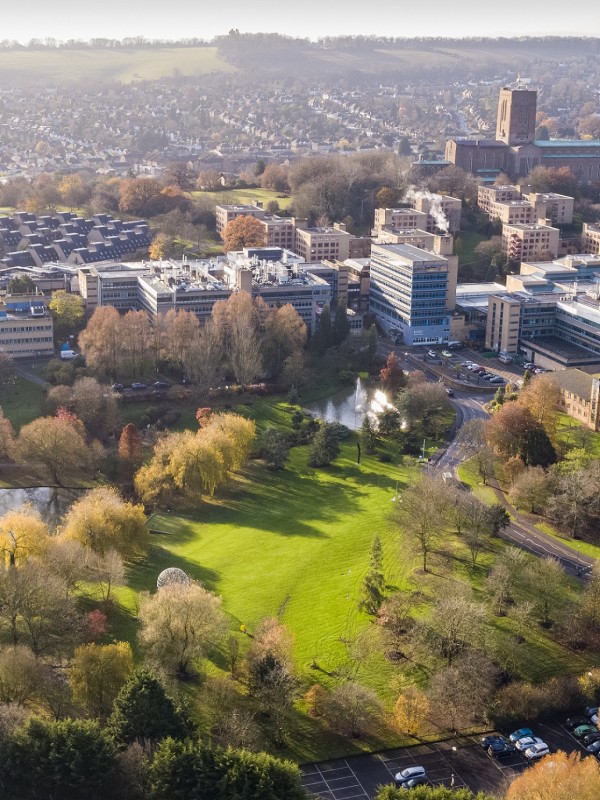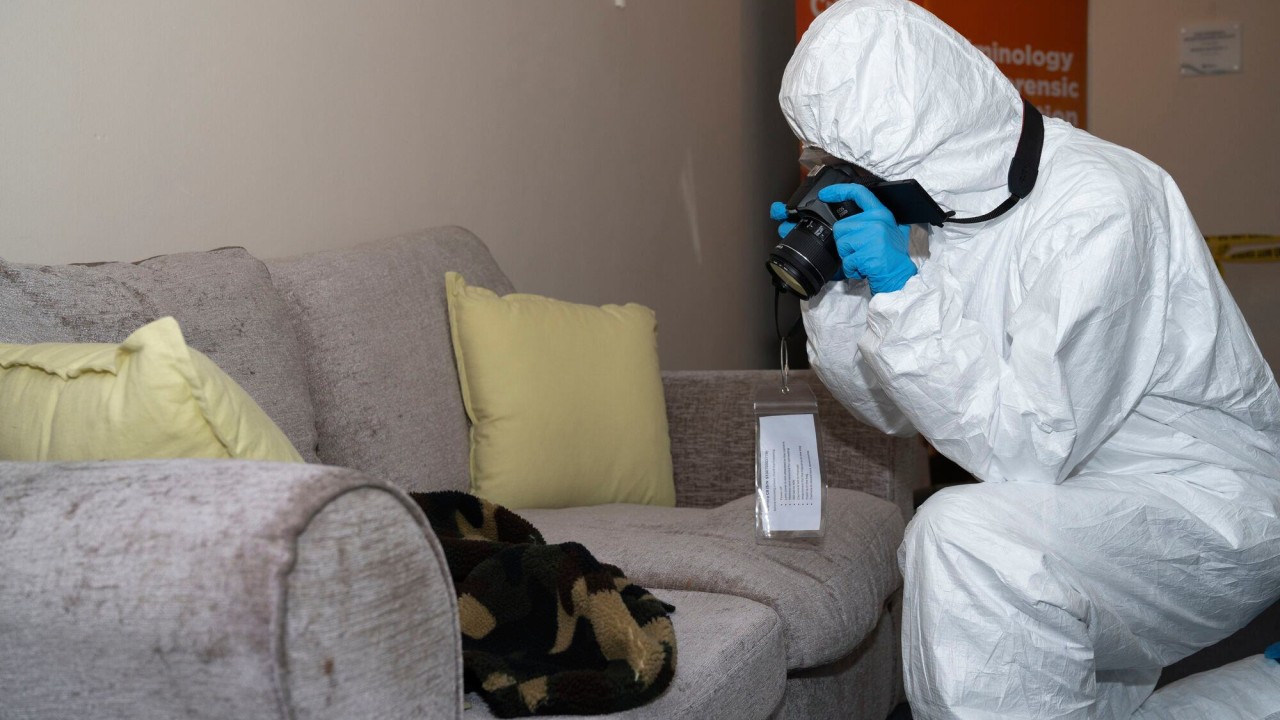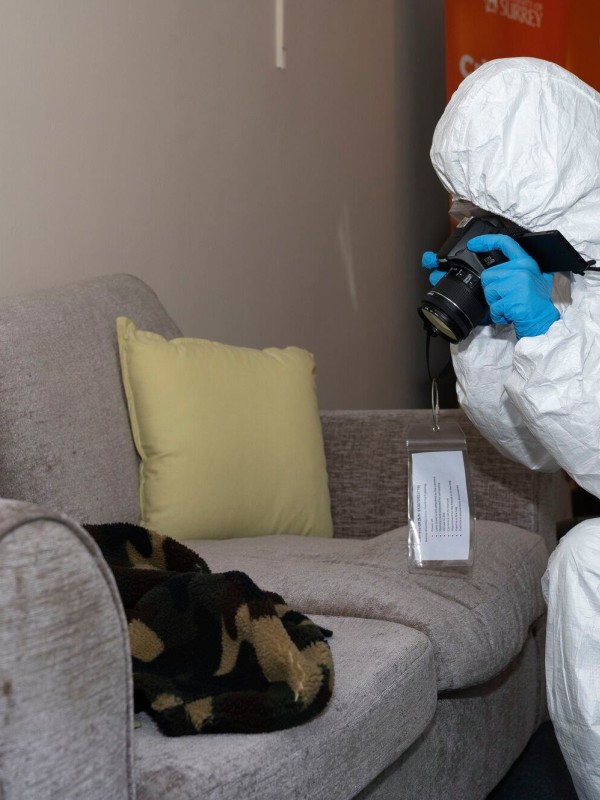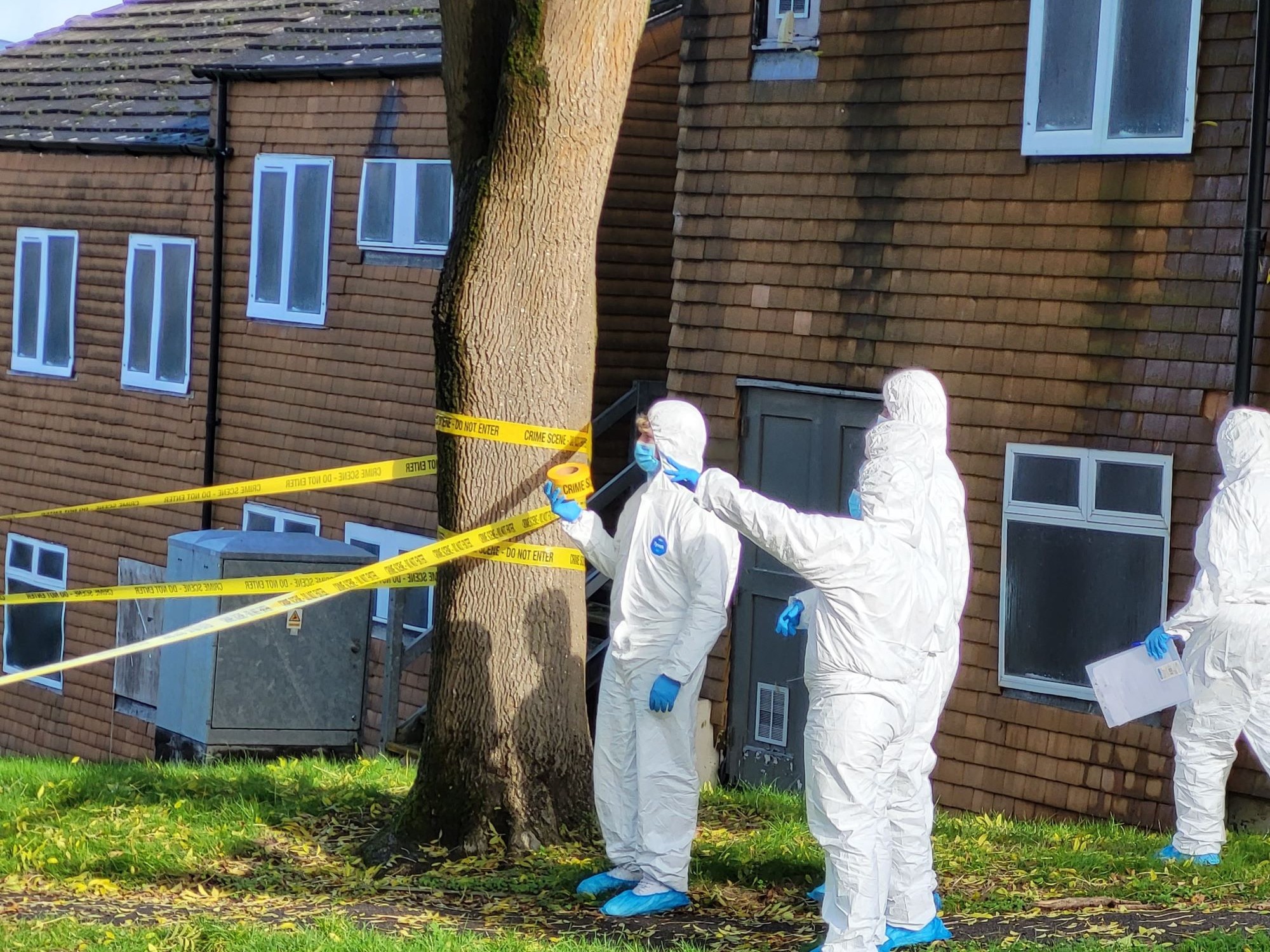
- Criminology with Forensic Investigation
BSc (Hons) — 2027 entry Criminology with Forensic Investigation
Discover what drives criminal behaviour and uncover the secrets of crime scene investigation. Step into our state-of-the-art crime scene flat for hands-on experience, applying real-world techniques in a safe, controlled environment. Build practical, analytical and communication skills that employers value – preparing you for an exciting career in criminal justice and investigation.
4,161+ people have created a bespoke digital prospectus
Why choose
this course?
- Our research-led Criminology with Forensic Investigation BSc will help you develop a critical perspective on contemporary issues relating to crime, deviance, the criminal justice system, and the processes of crime investigation.
- Take the opportunity to get industry-ready with our award-winning Professional Training placements.
- Turn theory into practice in our ‘crime scene flat’ where you’ll apply and analyse crime scene methods in a controlled and highly realistic environment.
- You’ll develop a full range of robust social research skills highly sought after by employers and ideal for developing a career in the public sector, policy development or research, or as a launchpad for further training to work in specialist areas such as forensic investigation or counselling.
- Our broad range of optional modules in your second and third years gives you the flexibility to shape your degree to your interests and develop specialist knowledge in a range of topics.
Statistics
8th in the UK
For Criminology in the Guardian University Guide 2026
3rd in the UK
Ranked 3rd in the UK and top 20 in the world for sociology in the ShanghaiRanking's Global Ranking of Academic Subjects 2024
Top 5 in the UK
Sociology is ranked 5th for overall student satisfaction* in the National Student Survey 2025
What you will study
What motivates offenders? How does forensic evidence help to support investigations? How do we use forensic intelligence to develop strategies? How does crime impact victims, and which punishments should be imposed on criminals? These are some of the questions you’ll explore on our BSc Criminology with Forensic Investigation programme.
This course will develop your understanding of the concepts, theories, and principles of both criminology and forensic investigation. You will also learn how they apply to a range of crimes and criminal justice issues.
We will help you to develop your practical and analytical skills in addressing contemporary criminological and crime investigation challenges. You’ll also learn about the methods and analytical tools required to conduct and evaluate research on contemporary problems relating to crime, deviance, social control, criminal justice, and forensic investigation.
From the second year, you’ll also be able to choose from a variety of optional modules, to allow you to shape your degree to your interests and career aspirations. Our modules are taught by experts in the field, meaning that content is always up-to-date and covers subjects at the cutting-edge of current issues and debate.
Criminology with Forensic Investigation at the University of Surrey is taught within our interdisciplinary School of Social Sciences, which enables students to learn about related topics, such as sociology and media and communication, during their degree and to shape their course to suit their interests through optional modules.
Which criminology undergraduate degree is right for me?
We offer five pathways to study criminology. Let us take you through the differences between all of our courses so you know what makes each of them special.
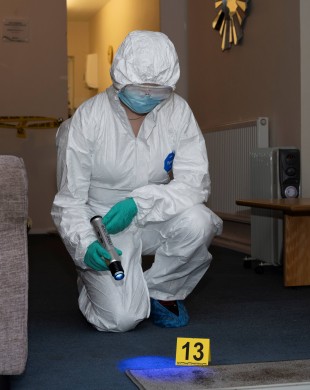
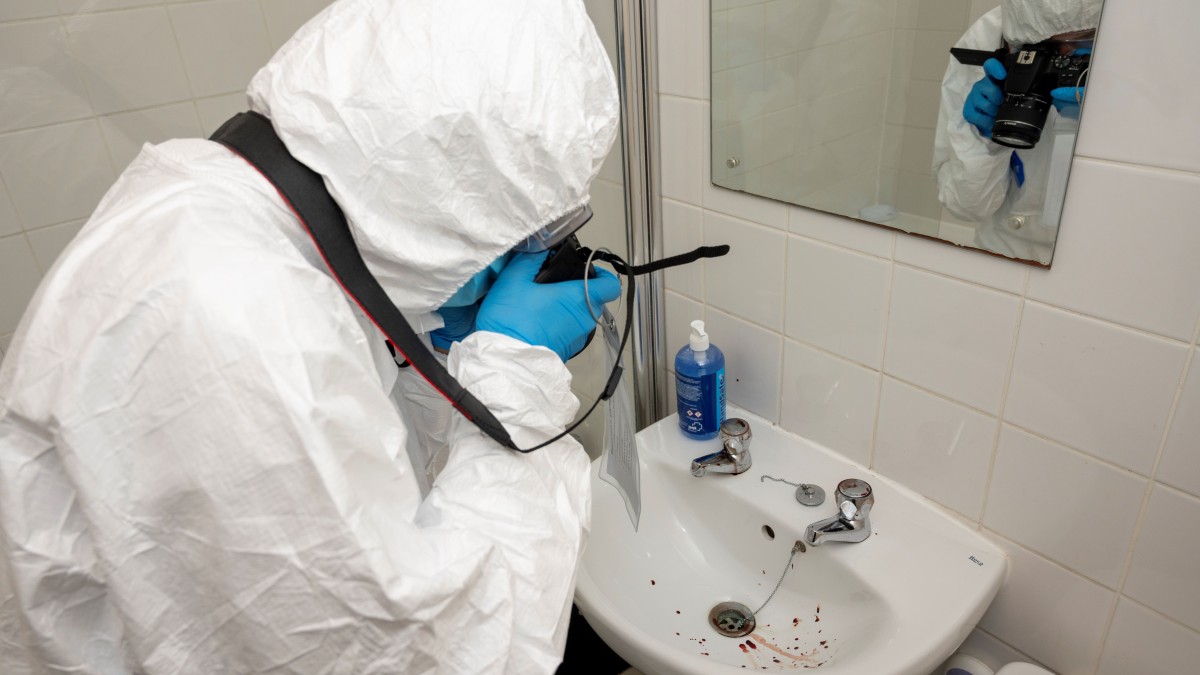
Facilities
Students will have access to practical spaces for developing and applying their knowledge about criminal justice. The University of Surrey is now, for example, home to a 'crime scene flat' that enables real-world application of investigation techniques and a 'Court of the Future' which offers insight into the operations of the courts and the developments in automated and artificial intelligence technologies in the courtroom.
You’ll benefit from our modern teaching facilities including a recently expanded and fully networked computer laboratory. In addition to the in-person teaching, the course will be enhanced through the use of online resources, including videos, podcasts, web-based audience response systems and student discussion forums.
The academic year is divided into two semesters of 15 weeks each. Each semester consists of a period of teaching, revision/directed learning and assessment.
The structure of our programmes follow clear educational aims that are tailored to each programme. These are all outlined in the programme specifications which include further details such as the learning outcomes.
- Criminology with Forensic Investigation BSc (Hons)
- Criminology with Forensic Investigation BSc (Hons) with placement
Please note: The full module listing for the optional Professional Training placement part of your course is available in the relevant programme specification.
Modules
Modules listed are indicative, reflecting the information available at the time of publication. Modules are subject to teaching availability, student demand and/or class size caps.
The University operates a credit framework for all taught programmes based on a 15-credit tariff.
Course options
Year 1 - BSc (Hons)
Semester 1
Compulsory
This module is designed to help students successfully make the transition from further to higher education and lays the groundwork for thriving at university. It introduces students to the academic, employability and professional, and other skills and capabilities that they will need throughout their course (and beyond) and provides foundations upon which to build their confidence in meeting the varying demands of their degree programme. As such, the module aims to introduce and develop resourcefulness and resilience amongst students (alongside other skills and capabilities – see ‘other information’, below) that will prepare them for concurrent and future module requirements. Rather than simply being about ‘study skills’, this module approaches the development of academic learning, employability, and professional and other relevant skills and capabilities from a holistic, subject area-specific perspective. The intention here is to enable students to situate their learning within the expectations of the social sciences more generally, but within the demands of criminology and forensic investigation more specifically, with a particular focus on the interconnectivity of what might initially appear to be discreet and/or loosely related components. Moreover, the module is ‘outward facing’ in the sense that it recognises the requirements of other modules across the programme and further integrates the development of the capabilities required for those here
View full module detailsThe purpose of this module is to give students a fundamental understanding of the conceptual frameworks underpinning forensic science. In this first-year module a very wide array of evidence types are covered. Casework examples are used to give students a broad understanding of how forensic evidence is retrieved, packaged, analysed and reported in court. This module interacts with material that students are taught through analytical chemistry modules and demonstrates the application of relevant techniques to forensic casework. This module supports further learning across a number of criminology modules.
View full module detailsSemester 2
Compulsory
The Criminal Justice System comprises those institutions and agencies that are collectively responsible for managing a state’s response to crime and disorder. This module provides an introduction to the key agencies within the contemporary criminal justice system in England and Wales but parallels are also drawn to other jurisdictions (where appropriate). We will focus on the role and function of the police service, prosecutors, courts, prisons and the probation service.
View full module detailsThis module introduces students to Forensic Criminology, which examines the intersections of criminology, forensic science, the penal system, and criminal investigation. The disciplines of criminology (broadly, the explanation and understanding of crime, criminals, and criminal justice institutions) and forensic science (knowledge produced to assist those working within the penal system to do their job more effectively) have long been separate entities, with different aims, objectives, approaches, and epistemologies (the philosophical study of knowledge). More recently, however, these two disciplines have begun to merge closer together in an attempt to provide a more complete and robust understanding of crime and criminality.
View full module detailsSemester 1 & 2
Compulsory
This module will introduce students to the major theoretical perspectives that have been developed within criminology to conceptualise 'crime' and 'deviance', and to explain the different ways societies respond to crime.Part A covers a number of theoretical developments from 'classical' and 'positive' theories all the way to more critical approaches within the discipline. Part B builds on knowledge acquired in Part A and provides an overview of contemporary debates and discussions within criminology, including but not limited to life-course approaches, problems of governance, and criminal justice policy. A common thread across the module will be how criminological theories can be situated and explained within specific contexts of society and criminal justice.The module will help students to develop a critical awareness of how contemporary criminological theories both contribute to an understanding of criminality as well as shaping and generating ideas and responses to crime and deviance. Students will also explore how specific theoretical perspectives can help us to address criminal justice problems such as punishment, incarceration, and social control. In so doing, students will gain a deeper understanding of the interplay between theory and practice and how the two can inform and influence one another.
View full module detailsThis module introduces students to qualitative and quantitative approaches to research design, methodology and data analysis. Part A focuses on qualitative field methods, including in-depth interviews, focus groups, and ethnographic observation, and their place within the wider research process. Students will explore the insights and possibilities generated by qualitative research as well as some of the challenges that qualitative researchers may encounter. Part B is designed to introduce students to the statistical techniques necessary for implementing and critically evaluating quantitative social research. Emphasis will be put on when and how data is collected, how to use basic statistical techniques to analyse the data appropriately, and how to interpret results. Students will also acquire a familiarity with R, a software environment for statistical computing and graphics.
View full module detailsYear 2 - BSc (Hons)
Semester 1
Compulsory
This module is concerned with understanding the contribution of psychological explanations (connecting to Sociological and Criminological) for understanding criminal behaviour. It introduces students to theories and concepts of criminal behaviour according to Psychology and the context in which these ideas emerge. In particular, the module focuses on specific categories of criminal behaviour – for example, mentally disordered offences, the ‘psychopath’, violent criminals, and serial murderers. In doing so, the module seeks to examine how particular crimes come to be sensationalised and glorified by and through various media platforms. The module also sets out to examine the means for managing and evaluating interventions designed to reduce crime and re-offending, and thus enable students to consider more widely, the role of Psychology within Western criminal justice systems.
View full module detailsThis second-year module directly builds upon learning from the first year of the programme and is designed to compliment the other second module; Forensic Analysis Methods. The module progresses the student learning journey by introducing students to the processes of criminal investigation, within a policing context. Specifically, this module situates key crime scene and forensic investigation processes within the wider context of criminal investigation and police processes. The particular focus of this module is volume crime and some serious crime types, reserving the management and investigation of major, and complex crime for the corresponding module in the final year of the programme.
View full module detailsOptional
This module looks at the role of contemporary technologies within crime and the criminal justice system and critically engages with current thinking around the extent to which technology can be a ‘enabler’ or ‘facilitator’ of crime. The module seeks to develop critical understanding of the increasing role of technology within the criminal justice system – for example, forensic technologies such as fingerprinting and DNA profiles, ‘predictive’ technologies such as polygraph tests and neural scanning and enforcement/punitive technologies such as tasers. The module pays special attention to arguments that ‘technological fetishism’ may be undermining the autonomy of the justice system, with the result that ‘technological justice’ may be replacing due process and the rule of law, engaging with the increasing role of AI and automation within justice.
View full module detailsThis module builds upon the research methods training which students received in their first year to provide students with a more robust understanding of some of the main quantitative analysis approaches in the social sciences. Students will learn about multivariate quantitative analyses with the help of R, a software environment for statistical computing and graphics. They will investigate a range of topics in sociology and criminology by accessing suitable secondary data from the UK Data Service, analysing data using R, and interpreting and presenting the results of quantitative analyses.
View full module detailsA number of key global challenges are introduced in this module, focusing on the valuable contribution social research can make to addressing issues such as climate emergency and sustainable living, food insecurity, precarious work and resilience, energy crisis and health inequalities. We examine the role of research in developing, evaluating and improving policy at local, national and global levels. The process of policy making is studied at its different stages, how researchers can contribute and the types of interventions that are possible and effective. Only by understanding this process can research be designed and communicated in appropriate ways to inform policy and change behaviour, so increasing the value of the research, of the work of the researcher and the impact the research has. The concept of research impact is explored as part of the module, in terms of making a positive contribution to improve practices, as well as in terms of academic agendas for impactful research and its relationship to funding. In particular, we employ the latest Research Evaluation Framework (REF) Impact Case Studies to explore good examples of impactful research. This also serves to reinforce an understanding of the relationship between good project design and research outcomes, and provides an opportunity to showcase the impactful work of Surrey University staff. Students will have the opportunity to study a series of specific social challenges, with access to academic experts sharing the challenges, recommendations and impacts of the research they have contributed to address these. Not only does this enable research-led teaching, but students will build up an understanding of the specific global challenges and policy areas, as well as what the research, policy making and evaluation career pathways can involve.
View full module detailsSemester 2
Compulsory
This module examines the history, role, and function of the police service. We consider the nature of the policing task, the contemporary organisation of the service and a range of issues to do with accountability, efficiency, and effectiveness. We will also consider styles of policing, how they have changed over time and the investigation and detection of crime. We look also at some areas which have proved difficult for the service to police which include rape, domestic violence, drugs and organised crime and terrorism.
View full module detailsOptional
The module explores the variety of ways that individuals, groups and states have responded to crime problems, looking at the philosophical justifications and the sociological explanations. It will consider the way of punishment has been implemented, what they intended to achieve and their outcomes.
View full module detailsThe relationships between crime and the media have long been the subject of intense debate. This module introduces students to the sociological analysis of crime and its representation in the media. We will explore how crime is portrayed in the media and assess the extent to which such media representations are accurate. We will also examine what effects, if any, these representations have on offending and public opinion about crime as well as on criminal justice.
View full module detailsThis module will introduce students to the study of environmental crime. It will examine a wide range of issues related to the damaging relationship between humans and the ecological world. It will include a detailed examination of specific topics such as climate change, corporate environmental crime, threats to biodiversity and waste crime. Additionally, key theoretical debates surrounding the legal notions of harms against the environment and the classification of non-humans as victims of crime will be discussed. Students will be introduced to a range of approaches to policing different types of environmental crimes and the legal, financial and practical problems these present for governments and enforcement agencies.
View full module detailsThis module builds upon the research methods training which students receive in their first year in order to provide students with a more detailed understanding of qualitative methods. While recognising interplay between the different stages, this module is structured around the general stages of conducting qualitative research - planning, conducting, analysing and writing about qualitative research. Students will learn about new developments in qualitative research including creative and visual methods, different types of ethnographies and mobile methodologies. They will also enhance their skill set by learning different methods of analysing qualitative data including computer assisted qualitative data analysis.
View full module detailsSemester 1 & 2
Compulsory
The primary focus of this degree programme is the work undertaken by a range of actors as part of a criminal investigation, from the initial investigation, the collection of evidence, and the subsequent analysis of that evidence, all with the purpose of ultimately identifying those responsible for the crime and securing their prosecution and conviction in court. The courtroom and our adversarial approach to the delivery of justice, however, present a range of challenges situated at the axis of the relationship between science, evidence, law, and procedure. This module therefore explores the scientific expertise offered by expert witnesses and higher crime scene management aspects of forensic investigations and introduces students to the challenges faced by experts within the courtroom setting. It begins by revising the scientific principles and fundamental understanding acquired in level 4 and will then critically review the crime scene investigation process followed by the techniques used in the analysis of forensic science evidence. It culminates in the interpretation and presentation of evidence in the court room with a focus on developing student awareness, knowledge and interest in roles and careers in the forensic investigation arena.
View full module detailsOptional modules for Year 2 - FHEQ Level 5
Please choose 3 options - one in Semester 1 and two in Semester 2
Year 3 - BSc (Hons)
Semester 1
Compulsory
This final-year module directly builds upon knowledge and skills acquired from the first and second years of the programme and progresses the learning journey by immersing students in the management of criminal and forensic investigations relating to major crime. Whilst the Level Five Criminal and Forensic Investigation module focused on volume crime, where evidence types are fewer and investigative resources are necessarily limited, this Level Six module concentrates on the more complex management and investigation processes associated with more serious types of crime. In particular, there is a focus on the roles, responsibilities, and decision-making of the Senior Investigating Officer (SIO), the Senior Crime Scene Investigator (SCSI), and the Forensic Management Team when conducting major crime enquiries, and on the challenges associated with multiple evidence types and different evidence providers in relation to building a case for presentation at court.
View full module detailsOptional
This module traces the social relations between youth, crime, and changing social, political and policy cultures. The ways young people have been responded to by a variety of controlling agencies, such as the police, prison system, and more social welfare orientated agencies such as social services has been a recurrent theme in criminology. This has encompassed critical questions with respect to; why young people receive more focus than adults? What kinds of young people are subject to greater levels of intervention? Whether this is just or necessary? And in what ways have particular social control technologies affected the lives of young people? This module will place particular focus on specific digital capacities of control, how and why they have developed, and the significance these have for the practical outcomes of policy agendas such as ‘youth diversion’, ‘anti-social behaviour’ and ‘youth justice’, including whether these interventions work across international contexts from global and cultural capabilities perspectives. Overall, the module will encourage students to actively apply the linkages between historical, theoretical, and everyday policies of social control used against young people, and to demonstrate a critical knowledge of these debates and issues using a range of criminological and sociological approaches. Practice examples are offered throughout the module, to understand ways of working with young people in accordance with employability, as well as ways of utilising resources to support youth from a resourcefulness and resilience perspective.
View full module detailsIdeas of deviance and the impulse to regulate human behaviour accordingly have not always focused exclusively on more obvious and familiar “crimes”. A striking feature in the development of all societies has been the apparent need to police and control the bodies & associated pleasures of their citizens. While this has always centred around predictably “deviant” activities like sexual behaviour, dance, carnival, and so on it is arguable that the will to proscribe ranges of ostensibly harmless enjoyments as deviant has expanded significantly in the aftermath of the “permissive” revolutions of the 60’s. Contemporary drug-culture, the multi-faceted sexual behaviours of the modern world, the explosion of pornography facilitated by the internet; the dance & club scene, extreme sports & bloodsports; ‘cruelty’ TV and so on all represent arenas where societal tensions between the experience of pleasure and the urge to criminalise it continue to develop. But given that the majority of pleasure-seeking behaviours are personal and non-harmful and given further that, (as Schlosser has recently argued) the drugs and sex industries now constitute bigger industries than traditional ones in advanced economies like the US, it is an obvious question to ask why the regulation of pleasure is still an issue at all? This level 6 module seeks to critically examine why the impulse to regulate bodies and their behaviour has developed in the way that it has and how this has manifested itself within modernity. It aims to challenge students across the Criminology and Sociology programmes to re-evaluate the nature of social order and to consider the relation between these social sciences in responding to this. .
View full module detailsThis module will focus specifically on the use of prisons as a form of punishment in society. This will include an examination of the growing prison crisis, the rise of supermax prisons and the privatisation of prisons. It will also consider how particular social groups experience prison, and the harms of imprisonment for individuals.
View full module detailsThis module focuses on victims of crime. Recent years have seen increasing awareness of and attention to victims’ experiences of crime and the criminal justice system. This module explores the nature and extent of victimisation, victim policy and practice, and the role of victims within the criminal justice system. The module covers theoretical perspectives on victims and victimisation, national and international policy development, the ”victims’ movement” and the nature and impact of public perceptions/attitudes towards different types of victim. The module critically examines who is and is not recognised as a victim, and how this has changed over time. The module explores new and changing approaches to responding to victimisation, including restorative justice.
View full module detailsSemester 2
Compulsory
The purpose of this module is to provide an insight into the most up to date methods employed within investigations and methods that are currently being developed that may be deployed in the future. Students will also focus on the implications of bias and psychology in decision making during investigations and the multidisciplinary nature of forensic investigation which supports the need to work collaboratively to address shared goals within the criminal justice system. This is to ensure that students have knowledge of cutting-edge techniques and are equipped with key transferrable skills which can be applied in their future careers.
View full module detailsOptional
Whilst the problem of hate crime has been, until relatively recently, largely neglected as a distinct area of criminological research in the UK and around the world, changes to political, criminal and social justice agendas have given hate crime much greater significance over the past 30 years or so. This module is therefore designed to provide students with a broad historical, theoretical, and contemporary understanding of the key issues relating to hate crime. Particular focus is placed on examining the different forms that hate crime can take and the impact it can have on victims and wider communities, whilst the motivations behind hate crime perpetration are also explored, as are the various legal and wider criminal justice and other relevant responses to it, all within an international context. Students are also encouraged to think critically about issues relating to identity politics, diversity, and the broader social construction of contemporary crime problems. The module relates to the degree programme more broadly by discussing policing, victimisation, legislation, the criminal justice system, offending, social justice, and notions of identity and diversity, within the hate crime context. As such it builds upon previous learning that students will have undertaken in prior modules throughout the first two years of their degree programme.
View full module detailsThe study of cybercrime and cybersecurity not only represents one of the key emerging areas of research within contemporary criminology but is also a crucial problem of national policy and crime control. Recent (2016) data from the Crime Survey for England and Wales suggest that cybercrime may now be the most prevalent form of criminality in the UK and repeated breaches to key infrastructures across most jurisdictions have emphasized why it is has also become one of the main threats to international peace and security. This module will introduce students to the key themes within the study of cybercrime and cybersecurity – including, offence types and their prevalence; typical victims and perpetrators; policing and control measures; varieties of cybersecurity responses and the ‘human’ problem in making these resilient.
View full module detailsThe criminal justice process has often been charged with an over focus upon ‘working class’ crimes such as burglary or street robbery. As a result, it has been argued that many more serious crimes effected by more powerful or collective agents like corporations have been overlooked or policed less effectively. For example, environmental damage, financial misconduct, or illicit trading. In this module the nature of criminality effected by the corporate and business worlds and the kinds of measures intended to make corporations more responsible’ will be examined in detail. We consider how agents like corporations can be constructed as criminal actors, both conceptually and legally, the typical kinds of offences they are implicated in and what kinds of responses from the criminal justice system would be most appropriate in dealing with this. A series of case studies across a representative selection of corporate sectors will be used the structure and direct the module content.
View full module detailsSemester 1 & 2
Compulsory
This module enables students to focus on and research a topic of significance of their own choice. It enables them to build on, bring together and demonstrate the range of analytic, knowledge based and digital skills they have developed throughout their degree and equips them with new transferable skills of designing and developing an independent project and reporting this professionally. Students will use their digital, global and cultural capabilities to synthesize and communicate knowledge within their chosen project. Students work on their project with the guidance of an individual supervisor and participate in a series of workshops designed to provide guidance for key stages of the project. Within the 45 credit individual work module we offer a choice of two formats: Research-based dissertation project - Project approaches are diverse and include collection of primary data (e.g through interviews or surveys); secondary analysis of existing data sets; analysis of documentary or media sources or a systematic review of existing literature. A final project report of 10-12,00 words is prepared. Topic based portfolio focused on a chosen social issue, comprising:An academic literature review offering the rationale for the choice of issue A public-facing component (e.g. podcasts, vlogs, set of blog posts) explaining some aspect of the issue to a non-specialist audiencePolicy briefing notes giving advice to a chosen public body or institution on how to tackle the issue The choice of format allows students to demonstrate their achievements in the skillset they see as best suited for their next steps.
View full module detailsOptional modules for Year 3 - FHEQ Level 6
Please choose 3 options - two in Semester 1 and one in Semester 2
Year 1 - BSc (Hons) with placement
Semester 1
Compulsory
This module is designed to help students successfully make the transition from further to higher education and lays the groundwork for thriving at university. It introduces students to the academic, employability and professional, and other skills and capabilities that they will need throughout their course (and beyond) and provides foundations upon which to build their confidence in meeting the varying demands of their degree programme. As such, the module aims to introduce and develop resourcefulness and resilience amongst students (alongside other skills and capabilities – see ‘other information’, below) that will prepare them for concurrent and future module requirements. Rather than simply being about ‘study skills’, this module approaches the development of academic learning, employability, and professional and other relevant skills and capabilities from a holistic, subject area-specific perspective. The intention here is to enable students to situate their learning within the expectations of the social sciences more generally, but within the demands of criminology and forensic investigation more specifically, with a particular focus on the interconnectivity of what might initially appear to be discreet and/or loosely related components. Moreover, the module is ‘outward facing’ in the sense that it recognises the requirements of other modules across the programme and further integrates the development of the capabilities required for those here
View full module detailsThe purpose of this module is to give students a fundamental understanding of the conceptual frameworks underpinning forensic science. In this first-year module a very wide array of evidence types are covered. Casework examples are used to give students a broad understanding of how forensic evidence is retrieved, packaged, analysed and reported in court. This module interacts with material that students are taught through analytical chemistry modules and demonstrates the application of relevant techniques to forensic casework. This module supports further learning across a number of criminology modules.
View full module detailsSemester 2
Compulsory
The Criminal Justice System comprises those institutions and agencies that are collectively responsible for managing a state’s response to crime and disorder. This module provides an introduction to the key agencies within the contemporary criminal justice system in England and Wales but parallels are also drawn to other jurisdictions (where appropriate). We will focus on the role and function of the police service, prosecutors, courts, prisons and the probation service.
View full module detailsThis module introduces students to Forensic Criminology, which examines the intersections of criminology, forensic science, the penal system, and criminal investigation. The disciplines of criminology (broadly, the explanation and understanding of crime, criminals, and criminal justice institutions) and forensic science (knowledge produced to assist those working within the penal system to do their job more effectively) have long been separate entities, with different aims, objectives, approaches, and epistemologies (the philosophical study of knowledge). More recently, however, these two disciplines have begun to merge closer together in an attempt to provide a more complete and robust understanding of crime and criminality.
View full module detailsSemester 1 & 2
Compulsory
This module will introduce students to the major theoretical perspectives that have been developed within criminology to conceptualise 'crime' and 'deviance', and to explain the different ways societies respond to crime.Part A covers a number of theoretical developments from 'classical' and 'positive' theories all the way to more critical approaches within the discipline. Part B builds on knowledge acquired in Part A and provides an overview of contemporary debates and discussions within criminology, including but not limited to life-course approaches, problems of governance, and criminal justice policy. A common thread across the module will be how criminological theories can be situated and explained within specific contexts of society and criminal justice.The module will help students to develop a critical awareness of how contemporary criminological theories both contribute to an understanding of criminality as well as shaping and generating ideas and responses to crime and deviance. Students will also explore how specific theoretical perspectives can help us to address criminal justice problems such as punishment, incarceration, and social control. In so doing, students will gain a deeper understanding of the interplay between theory and practice and how the two can inform and influence one another.
View full module detailsThis module introduces students to qualitative and quantitative approaches to research design, methodology and data analysis. Part A focuses on qualitative field methods, including in-depth interviews, focus groups, and ethnographic observation, and their place within the wider research process. Students will explore the insights and possibilities generated by qualitative research as well as some of the challenges that qualitative researchers may encounter. Part B is designed to introduce students to the statistical techniques necessary for implementing and critically evaluating quantitative social research. Emphasis will be put on when and how data is collected, how to use basic statistical techniques to analyse the data appropriately, and how to interpret results. Students will also acquire a familiarity with R, a software environment for statistical computing and graphics.
View full module detailsYear 2 - BSc (Hons) with placement
Semester 1
Compulsory
This module is concerned with understanding the contribution of psychological explanations (connecting to Sociological and Criminological) for understanding criminal behaviour. It introduces students to theories and concepts of criminal behaviour according to Psychology and the context in which these ideas emerge. In particular, the module focuses on specific categories of criminal behaviour – for example, mentally disordered offences, the ‘psychopath’, violent criminals, and serial murderers. In doing so, the module seeks to examine how particular crimes come to be sensationalised and glorified by and through various media platforms. The module also sets out to examine the means for managing and evaluating interventions designed to reduce crime and re-offending, and thus enable students to consider more widely, the role of Psychology within Western criminal justice systems.
View full module detailsThis second-year module directly builds upon learning from the first year of the programme and is designed to compliment the other second module; Forensic Analysis Methods. The module progresses the student learning journey by introducing students to the processes of criminal investigation, within a policing context. Specifically, this module situates key crime scene and forensic investigation processes within the wider context of criminal investigation and police processes. The particular focus of this module is volume crime and some serious crime types, reserving the management and investigation of major, and complex crime for the corresponding module in the final year of the programme.
View full module detailsOptional
This module looks at the role of contemporary technologies within crime and the criminal justice system and critically engages with current thinking around the extent to which technology can be a ‘enabler’ or ‘facilitator’ of crime. The module seeks to develop critical understanding of the increasing role of technology within the criminal justice system – for example, forensic technologies such as fingerprinting and DNA profiles, ‘predictive’ technologies such as polygraph tests and neural scanning and enforcement/punitive technologies such as tasers. The module pays special attention to arguments that ‘technological fetishism’ may be undermining the autonomy of the justice system, with the result that ‘technological justice’ may be replacing due process and the rule of law, engaging with the increasing role of AI and automation within justice.
View full module detailsThis module builds upon the research methods training which students received in their first year to provide students with a more robust understanding of some of the main quantitative analysis approaches in the social sciences. Students will learn about multivariate quantitative analyses with the help of R, a software environment for statistical computing and graphics. They will investigate a range of topics in sociology and criminology by accessing suitable secondary data from the UK Data Service, analysing data using R, and interpreting and presenting the results of quantitative analyses.
View full module detailsA number of key global challenges are introduced in this module, focusing on the valuable contribution social research can make to addressing issues such as climate emergency and sustainable living, food insecurity, precarious work and resilience, energy crisis and health inequalities. We examine the role of research in developing, evaluating and improving policy at local, national and global levels. The process of policy making is studied at its different stages, how researchers can contribute and the types of interventions that are possible and effective. Only by understanding this process can research be designed and communicated in appropriate ways to inform policy and change behaviour, so increasing the value of the research, of the work of the researcher and the impact the research has. The concept of research impact is explored as part of the module, in terms of making a positive contribution to improve practices, as well as in terms of academic agendas for impactful research and its relationship to funding. In particular, we employ the latest Research Evaluation Framework (REF) Impact Case Studies to explore good examples of impactful research. This also serves to reinforce an understanding of the relationship between good project design and research outcomes, and provides an opportunity to showcase the impactful work of Surrey University staff. Students will have the opportunity to study a series of specific social challenges, with access to academic experts sharing the challenges, recommendations and impacts of the research they have contributed to address these. Not only does this enable research-led teaching, but students will build up an understanding of the specific global challenges and policy areas, as well as what the research, policy making and evaluation career pathways can involve.
View full module detailsSemester 2
Compulsory
This module examines the history, role, and function of the police service. We consider the nature of the policing task, the contemporary organisation of the service and a range of issues to do with accountability, efficiency, and effectiveness. We will also consider styles of policing, how they have changed over time and the investigation and detection of crime. We look also at some areas which have proved difficult for the service to police which include rape, domestic violence, drugs and organised crime and terrorism.
View full module detailsOptional
The module explores the variety of ways that individuals, groups and states have responded to crime problems, looking at the philosophical justifications and the sociological explanations. It will consider the way of punishment has been implemented, what they intended to achieve and their outcomes.
View full module detailsThe relationships between crime and the media have long been the subject of intense debate. This module introduces students to the sociological analysis of crime and its representation in the media. We will explore how crime is portrayed in the media and assess the extent to which such media representations are accurate. We will also examine what effects, if any, these representations have on offending and public opinion about crime as well as on criminal justice.
View full module detailsThis module will introduce students to the study of environmental crime. It will examine a wide range of issues related to the damaging relationship between humans and the ecological world. It will include a detailed examination of specific topics such as climate change, corporate environmental crime, threats to biodiversity and waste crime. Additionally, key theoretical debates surrounding the legal notions of harms against the environment and the classification of non-humans as victims of crime will be discussed. Students will be introduced to a range of approaches to policing different types of environmental crimes and the legal, financial and practical problems these present for governments and enforcement agencies.
View full module detailsThis module builds upon the research methods training which students receive in their first year in order to provide students with a more detailed understanding of qualitative methods. While recognising interplay between the different stages, this module is structured around the general stages of conducting qualitative research - planning, conducting, analysing and writing about qualitative research. Students will learn about new developments in qualitative research including creative and visual methods, different types of ethnographies and mobile methodologies. They will also enhance their skill set by learning different methods of analysing qualitative data including computer assisted qualitative data analysis.
View full module detailsSemester 1 & 2
Compulsory
The primary focus of this degree programme is the work undertaken by a range of actors as part of a criminal investigation, from the initial investigation, the collection of evidence, and the subsequent analysis of that evidence, all with the purpose of ultimately identifying those responsible for the crime and securing their prosecution and conviction in court. The courtroom and our adversarial approach to the delivery of justice, however, present a range of challenges situated at the axis of the relationship between science, evidence, law, and procedure. This module therefore explores the scientific expertise offered by expert witnesses and higher crime scene management aspects of forensic investigations and introduces students to the challenges faced by experts within the courtroom setting. It begins by revising the scientific principles and fundamental understanding acquired in level 4 and will then critically review the crime scene investigation process followed by the techniques used in the analysis of forensic science evidence. It culminates in the interpretation and presentation of evidence in the court room with a focus on developing student awareness, knowledge and interest in roles and careers in the forensic investigation arena.
View full module detailsOptional modules for Year 2 (with PTY) - FHEQ Level 5
Please choose 3 options - one in Semester 1 and two in Semester 2
Year 3 - BSc (Hons) with placement
Semester 1
Compulsory
This final-year module directly builds upon knowledge and skills acquired from the first and second years of the programme and progresses the learning journey by immersing students in the management of criminal and forensic investigations relating to major crime. Whilst the Level Five Criminal and Forensic Investigation module focused on volume crime, where evidence types are fewer and investigative resources are necessarily limited, this Level Six module concentrates on the more complex management and investigation processes associated with more serious types of crime. In particular, there is a focus on the roles, responsibilities, and decision-making of the Senior Investigating Officer (SIO), the Senior Crime Scene Investigator (SCSI), and the Forensic Management Team when conducting major crime enquiries, and on the challenges associated with multiple evidence types and different evidence providers in relation to building a case for presentation at court.
View full module detailsOptional
This module traces the social relations between youth, crime, and changing social, political and policy cultures. The ways young people have been responded to by a variety of controlling agencies, such as the police, prison system, and more social welfare orientated agencies such as social services has been a recurrent theme in criminology. This has encompassed critical questions with respect to; why young people receive more focus than adults? What kinds of young people are subject to greater levels of intervention? Whether this is just or necessary? And in what ways have particular social control technologies affected the lives of young people? This module will place particular focus on specific digital capacities of control, how and why they have developed, and the significance these have for the practical outcomes of policy agendas such as ‘youth diversion’, ‘anti-social behaviour’ and ‘youth justice’, including whether these interventions work across international contexts from global and cultural capabilities perspectives. Overall, the module will encourage students to actively apply the linkages between historical, theoretical, and everyday policies of social control used against young people, and to demonstrate a critical knowledge of these debates and issues using a range of criminological and sociological approaches. Practice examples are offered throughout the module, to understand ways of working with young people in accordance with employability, as well as ways of utilising resources to support youth from a resourcefulness and resilience perspective.
View full module detailsIdeas of deviance and the impulse to regulate human behaviour accordingly have not always focused exclusively on more obvious and familiar “crimes”. A striking feature in the development of all societies has been the apparent need to police and control the bodies & associated pleasures of their citizens. While this has always centred around predictably “deviant” activities like sexual behaviour, dance, carnival, and so on it is arguable that the will to proscribe ranges of ostensibly harmless enjoyments as deviant has expanded significantly in the aftermath of the “permissive” revolutions of the 60’s. Contemporary drug-culture, the multi-faceted sexual behaviours of the modern world, the explosion of pornography facilitated by the internet; the dance & club scene, extreme sports & bloodsports; ‘cruelty’ TV and so on all represent arenas where societal tensions between the experience of pleasure and the urge to criminalise it continue to develop. But given that the majority of pleasure-seeking behaviours are personal and non-harmful and given further that, (as Schlosser has recently argued) the drugs and sex industries now constitute bigger industries than traditional ones in advanced economies like the US, it is an obvious question to ask why the regulation of pleasure is still an issue at all? This level 6 module seeks to critically examine why the impulse to regulate bodies and their behaviour has developed in the way that it has and how this has manifested itself within modernity. It aims to challenge students across the Criminology and Sociology programmes to re-evaluate the nature of social order and to consider the relation between these social sciences in responding to this. .
View full module detailsThis module will focus specifically on the use of prisons as a form of punishment in society. This will include an examination of the growing prison crisis, the rise of supermax prisons and the privatisation of prisons. It will also consider how particular social groups experience prison, and the harms of imprisonment for individuals.
View full module detailsThis module focuses on victims of crime. Recent years have seen increasing awareness of and attention to victims’ experiences of crime and the criminal justice system. This module explores the nature and extent of victimisation, victim policy and practice, and the role of victims within the criminal justice system. The module covers theoretical perspectives on victims and victimisation, national and international policy development, the ”victims’ movement” and the nature and impact of public perceptions/attitudes towards different types of victim. The module critically examines who is and is not recognised as a victim, and how this has changed over time. The module explores new and changing approaches to responding to victimisation, including restorative justice.
View full module detailsSemester 2
Compulsory
The purpose of this module is to provide an insight into the most up to date methods employed within investigations and methods that are currently being developed that may be deployed in the future. Students will also focus on the implications of bias and psychology in decision making during investigations and the multidisciplinary nature of forensic investigation which supports the need to work collaboratively to address shared goals within the criminal justice system. This is to ensure that students have knowledge of cutting-edge techniques and are equipped with key transferrable skills which can be applied in their future careers.
View full module detailsOptional
Whilst the problem of hate crime has been, until relatively recently, largely neglected as a distinct area of criminological research in the UK and around the world, changes to political, criminal and social justice agendas have given hate crime much greater significance over the past 30 years or so. This module is therefore designed to provide students with a broad historical, theoretical, and contemporary understanding of the key issues relating to hate crime. Particular focus is placed on examining the different forms that hate crime can take and the impact it can have on victims and wider communities, whilst the motivations behind hate crime perpetration are also explored, as are the various legal and wider criminal justice and other relevant responses to it, all within an international context. Students are also encouraged to think critically about issues relating to identity politics, diversity, and the broader social construction of contemporary crime problems. The module relates to the degree programme more broadly by discussing policing, victimisation, legislation, the criminal justice system, offending, social justice, and notions of identity and diversity, within the hate crime context. As such it builds upon previous learning that students will have undertaken in prior modules throughout the first two years of their degree programme.
View full module detailsThe study of cybercrime and cybersecurity not only represents one of the key emerging areas of research within contemporary criminology but is also a crucial problem of national policy and crime control. Recent (2016) data from the Crime Survey for England and Wales suggest that cybercrime may now be the most prevalent form of criminality in the UK and repeated breaches to key infrastructures across most jurisdictions have emphasized why it is has also become one of the main threats to international peace and security. This module will introduce students to the key themes within the study of cybercrime and cybersecurity – including, offence types and their prevalence; typical victims and perpetrators; policing and control measures; varieties of cybersecurity responses and the ‘human’ problem in making these resilient.
View full module detailsThe criminal justice process has often been charged with an over focus upon ‘working class’ crimes such as burglary or street robbery. As a result, it has been argued that many more serious crimes effected by more powerful or collective agents like corporations have been overlooked or policed less effectively. For example, environmental damage, financial misconduct, or illicit trading. In this module the nature of criminality effected by the corporate and business worlds and the kinds of measures intended to make corporations more responsible’ will be examined in detail. We consider how agents like corporations can be constructed as criminal actors, both conceptually and legally, the typical kinds of offences they are implicated in and what kinds of responses from the criminal justice system would be most appropriate in dealing with this. A series of case studies across a representative selection of corporate sectors will be used the structure and direct the module content.
View full module detailsSemester 1 & 2
Compulsory
This module enables students to focus on and research a topic of significance of their own choice. It enables them to build on, bring together and demonstrate the range of analytic, knowledge based and digital skills they have developed throughout their degree and equips them with new transferable skills of designing and developing an independent project and reporting this professionally. Students will use their digital, global and cultural capabilities to synthesize and communicate knowledge within their chosen project. Students work on their project with the guidance of an individual supervisor and participate in a series of workshops designed to provide guidance for key stages of the project. Within the 45 credit individual work module we offer a choice of two formats: Research-based dissertation project - Project approaches are diverse and include collection of primary data (e.g through interviews or surveys); secondary analysis of existing data sets; analysis of documentary or media sources or a systematic review of existing literature. A final project report of 10-12,00 words is prepared. Topic based portfolio focused on a chosen social issue, comprising:An academic literature review offering the rationale for the choice of issue A public-facing component (e.g. podcasts, vlogs, set of blog posts) explaining some aspect of the issue to a non-specialist audiencePolicy briefing notes giving advice to a chosen public body or institution on how to tackle the issue The choice of format allows students to demonstrate their achievements in the skillset they see as best suited for their next steps.
View full module detailsOptional modules for Year 3 (with PTY) - FHEQ Level 6
Please choose 3 options - two in Semester 1 and one in Semester 2
Professional Training Year (PTY)
Semester 1 & 2
Core
s module supports students’ development of personal and professional attitudes and abilities appropriate to a Professional Training placement. It supports and facilitates self-reflection and transfer of learning from their Professional Training placement experiences to their final year of study and their future employment. The PTY module is concerned with Personal and Professional Development towards holistic academic and non-academic learning, and is a process that involves self-reflection, documented via the creation of a personal record, planning and monitoring progress towards the achievement of personal objectives. Development and learning may occur before and during the placement, and this is reflected in the assessment model as a progressive process. However, the graded assessment takes place primarily towards the end of the placement. Additionally, the module aims to enable students to evidence and evaluate their placement experiences and transfer that learning to other situations through written and presentation skills.
View full module detailsThis module supports students’ development of personal and professional attitudes and abilities appropriate to a Professional Training placement. It supports and facilitates self-reflection and transfer of learning from their Professional Training placement experiences to their final year of study and their future employment. The PTY module is concerned with Personal and Professional Development towards holistic academic and non-academic learning, and is a process that involves self-reflection, documented via the creation of a personal record, planning and monitoring progress towards the achievement of personal objectives. Development and learning may occur before and during the placement, and this is reflected in the assessment model as a progressive process. However, the graded assessment takes place primarily towards the end of the placement. Additionally, the module aims to enable students to evidence and evaluate their placement experiences and transfer that learning to other situations through written skills.
View full module detailsThis module supports students’ development of personal and professional attitudes and abilities appropriate to a Professional Training placement. It supports and facilitates self-reflection and transfer of learning from their Professional Training placement experiences to their final year of study and their future employment. The PTY module is concerned with Personal and Professional Development towards holistic academic and non-academic learning and is a process that involves self-reflection. Development and learning may occur before and during the placement, and this is reflected in the assessment model as a progressive process. However, the graded assessment takes place primarily towards the end of the placement. Additionally, the module aims to enable students to evidence and evaluate their placement experiences and transfer that learning to other situations through written skills.
View full module detailsOptional modules for Professional Training Year (PTY) -
Students taking the PTY Year must choose one of the following modules; SOCP010, SOCP011 or SOCP012
Teaching and learning
At Surrey, we emphasise the development of your practical and analytical skills in addressing contemporary criminological and crime investigation problems and challenges.
You’ll benefit from a range of teaching methods, including small group tutorials, projects, workshops, crime scene practicals and laboratories as well as lectures. We find that our students learn more effectively in this environment, and projects will contribute to the development of your personal skills in leadership, effective communication and analytic ability.
Our excellent facilities – including our new crime scene flat and a dedicated networked computer suite – are available to aid your studies.
You will have the opportunity to be taught by leading academics working in fields of:
- Crime, deviance and the media (Dimitris Akrivos)
- Crime prevention and crime control (Francesca Menichelli)
- Crime scene investigation methods (Claire Rhodes)
- Cyber crime (Mike McGuire)
- Hate crime (Jon Garland)
- Illicit markets and organised crime (Giulia Berlusconi)
- Prisons (Maria Adams and Dan McCarthy)
- Spatial patterning of crime (Ian Brunton-Smith)
- Young people, online harms and harmful sexual behaviour (Robyn Muir and Emily Setty).
- Independent study
- Group work
- Tutorials
- Workshops
- Lectures
- Project work
Assessment
We assess modules individually and award credits for the successful completion of each one. Across the programme, assessment strategies will be wide, varied, and balanced to recognise and accommodate the needs of diverse learners, and will range from more traditional assessments such as essays to assessments based on practical activities designed to simulate ‘real world’ environments. These will help you build your practical and analytical skills and prepare you for employment following graduation.
Check individual module information to see full details at a module level.
General course information
Contact hours
Contact hours can vary across our modules. Full details of the contact hours for each module are available from the University of Surrey's module catalogue. See the modules section for more information.
Timetable
New students will receive their personalised timetable during Welcome Week. In later semesters, at least one week before the start of the semester.
Scheduled teaching can take place on any day of the week (Monday – Friday), with part-time classes normally scheduled on one or two days. Wednesday afternoons tend to be for sports and cultural activities.
View our code of practice for the scheduling of teaching and assessment (PDF) for more information.
Location
This course is based at Stag Hill campus. Stag Hill is the University's main campus and where the majority of our courses are taught.
We offer careers information, advice and guidance to all students whilst studying with us, which is extended to our alumni for three years after leaving the University.
Studying Criminology with Forensic Investigation will provide you with a broad social science foundation and a wide range of analytical, practical, and communication skills that are attractive to employers.
Our course gives you the knowledge - together with the research and analytical skills - that you need to pursue a professional career in criminal justice, forensic investigation, the public sector and civil service, business, education, the third sector, and social work.
Depending on which modules you choose, you can use your Criminology with Forensic Investigation degree to develop expertise for a range of different occupations. Specifically:
- It provides the knowledge and analytical skills needed to pursue a professional degree in the public sector, business, education or law.
- It offers preparation for fields that involve investigative skills and working with diverse groups of people, such as crime scene investigator, detective, policing, prisons, probation, politics, or public administration
- It provides the strong research skills needed for positions in business, social services and government
- It is a first step for future graduate study in order to become a researcher or lecturer.
The course also offers preparation for fields that involve investigative skills and working with diverse people, such as policing, journalism, politics, marketing, business, human resources, and public administration.
One of the benefits of a degree in criminology is flexibility in the job market. Some of the roles our students have taken after graduation on our criminology programmes include:
- Case Administrator
- Intelligence Researcher
- Police Constable
- Research Officer
- Social Researcher
- Trainee Probation Officer.
They have worked for employers such as:
- Access to Justice Foundation
- HM Inspectorate of Prisons
- National Offender Management Service
- National Probation Service
- Surrey Police
- Youth Justice Board.
In addition, about a quarter of our graduates go on to study for postgraduate degrees in a range of programmes and countries. On successful completion of this course you might want to progress to one of our masters courses. We are also proud of our record of alumni who have continued education up to doctoral level and become academic scholars in their own right.


Elizabeth
Student - Criminology with Forensic Investigation BSc (Hons)


James
Student - Criminology with Forensic Investigation BSc (Hons)
Learn more about the qualifications we typically accept to study this course at Surrey.
Typical offer
Overall: ABB-BBB
Please note: A-level General Studies and A-level Critical Thinking are not accepted. Applicants taking an A-level science subject with the Science Practical Endorsement are expected to pass the practical element.
GCSE or equivalent: English Language and Mathematics at Grade 4 (C) plus Science at grade 6 (B).
Overall: DDD-DDM
GCSE or equivalent: English Language and Mathematics at Grade 4(C) plus Science at grade 6 (B).
We can also consider a number of other BTEC qualifications or combinations of A-levels and BTEC qualifications. Please contact the Admissions team, specifying your programme of interest, along with details of your own particular combination of qualifications.
Overall: 33-32
GCSE or equivalent: English A HL4/SL4 or English B HL5/SL6, Mathematics (either course) HL4/SL4 and a Science subject HL4/SL4.
Overall: 78-75%
GCSE or equivalent: Maths 6, Science 6 and either English Language (1/2) 6 or English Language (3)7.
Overall: QAA-recognised Access to Higher Education Diploma, 30 Level 3 Credits at Distinction and 15 Level 3 Credits at Merit - 27 Level 3 Credits at Distinction and 18 Level 3 Credits at Merit.
GCSE or equivalent: Science 6 (B), English Language and Mathematics at Grade 4 (C).
Overall: AABBB-ABBBB
GCSE or equivalent: English Language - Scottish National 5 – C, Maths - Scottish National 5 – C, Science – Scottish National 5 -B
Overall: ABB-BBB from a combination of the Advanced Skills Baccalaureate Wales and two A-levels.
GCSE or equivalent: Please check the A-level dropdown for the required GCSE levels.
Please note: A-level General Studies and A-level Critical Thinking are not accepted. Applicants taking an A-level science subject with the Science Practical Endorsement are expected to pass the practical element.
- BSc (Hons):
- Distinction overall, with minimum C in the Core Component.
- BSc (Hons) with foundation year:
- Pass overall, with minimum D in the Core Component.
GCSE or equivalent: English Language and Mathematics at Grade 4 (C) plus Science at grade 6 (B).
Applicants taking the Extended Project Qualification (EPQ) will receive our standard A-level offer for this programme, plus an alternate offer of one A-level grade lower, subject to achieving an A grade in the EPQ. The one grade reduction will not apply to any required subjects.
Applicants can only receive one grade reduction from the published grades, an EPQ grade reduction can’t be applied in addition to other grade reductions made through other schemes such as Contextual Admissions or In2Surrey.
English language requirements
IELTS Academic: 6.5 overall with 6.0 in Writing and 5.5 in each other element.
View the other English language qualifications that we accept.
If you do not currently meet the level required for your programme, we offer intensive pre-sessional English language courses, designed to take you to the level of English ability and skill required for your studies here.


International Foundation Year
If you are an international student and you don’t meet the entry requirements for this degree, we offer the International Foundation Year at the Surrey International Study Centre. Upon successful completion, you can progress to this degree course.
Selection process
We normally make offers in terms of grades.
If you are a suitable candidate you will be invited to an offer holder event. During your visit to the University you can find out more about the course and meet staff and students.
Recognition of prior learning
View our Code of practice for Recognition of Prior Credit and Prior Learning and further guidance: Credit Transfer and Recognition of Prior Learning - Guide for Applicants (PDF) for more information.
We recognise that many students enter their higher education course with valuable knowledge and skills developed through a range of professional, vocational and community contexts.
If this applies to you, the recognition of prior learning (RPL) process may allow you to join a course without the formal entry requirements or enter your course at a point appropriate to your previous learning and experience. There are restrictions on RPL for some courses and fees may be payable for certain claims.
Contextual offers
Did you know eligible students receive support through their application to Surrey, which could include a grade reduction on offer?
Fees
Explore UKCISA’s website for more information if you are unsure whether you are a UK or overseas student. View the list of fees for all undergraduate courses.
Payment schedule
- Students with Tuition Fee Loan: the Student Loans Company pay fees in line with their schedule.
- Students without a Tuition Fee Loan: pay their fees either in full at the beginning of the programme or in two instalments as follows:
- 50% payable 10 days after the invoice date (expected to be during October to November of each academic year).
- 50% in January of the same academic year.
- The exact date(s) will be on invoices. Students on part-time programmes where fees are paid on a modular basis cannot pay fees by instalment.
- Sponsored students: must provide us with valid sponsorship information that covers the period of study.
Professional training placement fees
Professional Training placement year fees are approximately 20% of the full-time fee for the academic year in which you undertake your placement.
Additional costs
Optional expenses: Occasional optional trips to London or within Surrey will be organised by the University which may incur travel costs – £70 approximately.
These additional costs are accurate as of September 2025 and apply to the 2026 year of entry. Costs for 2027 entry will be published in September 2026.
Scholarships and bursaries
Discover what scholarships and bursaries are available to support your studies.
Our award-winning Professional Training placement scheme gives you the chance to spend a year in industry, either in the UK or abroad.
We have thousands of placement providers to choose from, most of which offer pay. So, become one of our many students who have had their lives and career choices transformed.
Statistics
Placement Statistics
92%
of students who did a placement entered into graduate level employment*
80%
of placements are paid, with 60% paying between £18,000 - £30,000
48%
of our students have been offered a graduate role from their placement provider**
*Graduate Outcomes 2025, HESA
**Professional training year returners survey 2024
Criminology placements
On our BSc (Hons) Criminology with Forensic Investigation course, you’ll have the option to enhance your knowledge by taking a year-long Professional Training placement between the second and third years of your degree.
As a result of the placement, we find that our students return to their final year significantly more confident, mature and organised, and with clearer career aspirations.
The process of preparing and applying for placement positions also significantly enhances job-seeking skills, which come into play in the final year and beyond when applying for graduate employment. After graduation, some students take up permanent posts with their professional placement employer.
We make every effort to identify possible placement opportunities according to your interests, career plans and location preferences. While you are expected to find your own placement, support is available both internally in Sociology and through our careers service.
Companies and organisations that have participated in the scheme include:
- Citizens Advice Bureau
- HM Inspectorate of Prisons
- HM Prison High Down
- Home Office
- Ministry of Justice
- National Police Chiefs Council
- Surrey County Council.
- Surrey Youth Support Service.
Applying for placements
Students are generally not placed by the University. But we offer support and guidance throughout the process, with access to a vacancy site of placement opportunities.
Find out more about the application process.
Study and work abroad
Studying at Surrey opens a world of opportunity. Take advantage of our study and work abroad partnerships, explore the world, and expand your skills for the graduate job market.
The opportunities abroad vary depending on the course, but options include study exchanges, work/research placements, summer programmes, and recent graduate internships. Financial support is available through various grants and bursaries, as well as Student Finance.
Perhaps you would like to volunteer in India or learn about Brazilian business and culture in São Paulo during your summer holidays? With 140+ opportunities in 36+ different countries worldwide, there is something for everyone. Explore your options via our search tool and find out more about our current partner universities and organisations.
Apply for your chosen course online through UCAS, with the following course and institution codes.
About the University of Surrey
Need more information?
Contact our Admissions team or talk to a current University of Surrey student online.
Terms and conditions
When you accept an offer to study at the University of Surrey, you are agreeing to follow our policies and procedures, student regulations, and terms and conditions.
We provide these terms and conditions at offer stage and are shown again at registration. You will be asked to accept these terms and conditions when you accept the offer made to you.
Disclaimer
This online prospectus has been published in advance of the academic year to which it applies.
Whilst we have done everything possible to ensure this information is accurate, some changes may happen between publishing and the start of the course.
It is important to check this website for any updates before you apply for a course with us. Read our full disclaimer.

